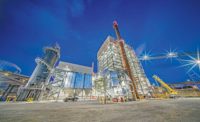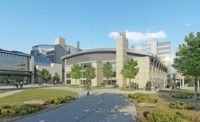A four-year-old biomass energy firm, backed in part by contractor investment, is succeeding where dozens of others have failed—in building one of the largest U.S. biomass plants that will turn waste wood into energy. While the $500-million project has had to deal with the low cost of competitive energy sources and a skeptical public, the accessibility of usable "fuel" in one of the country's most densely forested regions and the project's successful link with a local utility have allowed it to proceed where similar ventures have stalled.
The project's developer, Boston-based American Renewables, is prevailing against a weak economy, low natural gas prices and some local opposition as it builds the Gainesville, Fla., facility in a region touted by energy analysts as the "Saudi Arabia of wood." Despite the resource bounty, most of the dozens of past attempts to transform it into renewable energy have failed because proposals were not competitive enough to ink a power purchase agreement with a utility.
"Projects like Gainesville are successful because they have the support of the local utility," says Bob Cleaves, president of the national Biomass Power Association, a Portland, Maine-based advocacy group. "That translates into two important things: a power purchase agreement that will allow this project to move forward and a community that understands the forest products industry and the economics of what forestry means to the local economy."
Gainesville Regional Utilities selected American Renewables to build the Gainesville Renewable Energy Center after issuing a request for proposals for a biomass plant in 2007. The two entities then entered into their plant power purchase deal that the Gainesville City Commission approved two years later.
"Gainesville's choice to go with biomass is a strategic decision," says Bob Hunzinger, general manager with the city utility. "After six years of research and a vibrant public discussion, the city commission approved the biomass plant based on a thorough evaluation of alternatives, including other renewables and traditional fuel sources like coal and natural gas. Investing in biomass as the primary renewable energy source is the most cost-effective, long-term option currently available in Florida."
American Renewables selected Fagen Inc., Granite Falls, Minn., as the engineering, procurement and construction contractor for the plant. Zachry Engineering performed the engineering work. Fagen and American Renewables had previously worked together on a sister biomass plant that Fagen will complete this summer in Nacogdoches, Texas. NAES Corp. will provide operations and maintenance services to the Gainesville project, and BioResource Management Inc. will be responsible for securing wood for the plant. Wood Resource Recovery, a Gainesville waste wood recycler, will provide about 40% of the supply from land cleared for homes and rights of way within the metropolitan area and other suitable municipal wood waste sources.
Fagen began construction of the Gainesville plant last March, and company officials expect peak construction to occur later this year when about 700 laborers will work on site. The companies are planning to start operation by fall 2013, in time to take advantage of expiring federal production tax credits.
Fagen's owners have invested an undisclosed amount of capital into the project and will remain part owners of the facility. The terms of the agreement were not released. Evan Fagen, vice president at the firm, says the company has faith in American Renewable's business model and approach to biomass.
"American Renewables understands how to finish a project," Fagen says. "Some people may not do all of their due diligence and miss a few important steps. American Renewables understands what is needed and goes out and gets it."







